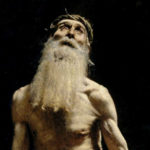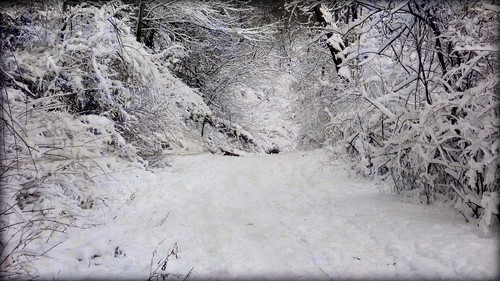We run our website the way we wished the whole internet worked: we provide high quality original content with no ads. We are funded solely by your direct support. Please consider supporting this project.
Did God Cause the Polar Vortex?
When is this polar vortex thing going to end? It’s March, and even in Minnesota we expect to see temperatures warmer than this. With all of the sleet and cold in the south, it seems like schools are closing more than they are open. While this is not a catastrophic event like a hurricane, tsunami, or earthquake, many still ask ask, “Why God?” Or, “God, when are you going to make this end.” And it’s not uncommon for some to say, “Well, the Good Lord knows what he is doing.”
This kind of talk reveals an underlying story that shapes how we commonly see God interacting with nature. It’s the story that God is orchestrating the weather, and one need not be a hard-core Calvinist to think this way. The following is an excerpt from Greg’s Satan and the Problem of Evil where he offers an alternative story about nature and natural evil, one that recognizes that “God is everywhere and at all times present in his creation maximizing good and minimizing evil. But to the extent that he has given creatures say-so, God has restricted the exercise of his own omnipotence” (213). As C. S. Lewis’s wrote in Mere Christianity, “Enemy-occupied territory—that is what the world is.” The following applies such a view to the realm of nature and natural evil.
_________________________________________
“In contrast to moral evil, ‘natural evil,’ says John Hick, ‘is the evil that originates independently of human actions: in disease bacilli, earthquakes, storms, droughts, tornadoes, etc.’ It is, in short, evil that lacks (or at least seems to lack) a moral agent behind it. It’s apparent cause lies within the ‘natural’ order of things” (243).
“Early Christian thinkers assumed that angels, like humans, were created free and given a sphere of influence and responsibility over creation and that, again like humans, angels could use this influence for good, as God intended, or for evil. … ‘Natural’ evil was explained as resulting from these spirits rebelling against God and thus abusing their authority over creation. Hence, for example, Origen argued that famines, scorching winds and pestilence were not ‘natural’ in God’s creation; they were rather the result of fallen angels bringing misery whenever and however they were able. …
“Reflecting the basic vision of the early church, Athenagoras [2nd century church father] concluded that everything in nature that obviously looks contrary to God’s character appears that way because it is contrary to God. It did not arise from the omni-benevolent hand of the Creator … but was due rather to the activity of this evil ‘ruling prince’ and the ‘demons his followers.’
“The view that evil spirits are largely responsible for ‘natural’ evil has been suggested throughout church history by many theologians. But due to the influence of Augustine’s blueprint model of divine providence, this insight was rarely considered the ultimate explanation of ‘natural’ evil, as it was before Augustine. The assumption was that everything Satan and demons do somehow fits into God’s meticulous plan for world history. Because of this, ‘natural’ evil has generally been regarded as a problem of understanding God’s providence, not an issue of spiritual warfare.
“Modern perspectives of ‘natural’ evil have drifted even further from the warfare perspective of Scripture and the postapostolic church. Under the influence of Enlightenment naturalism, rationalism, and biblical criticism, the very notion of evil spirits influencing the physical world became problematic. Physical laws became the ultimate explanation for anything in the physical world” (294-296).
Category: General
Tags: Natural Evil, Nature, Problem of Evil, Spiritual Warfare, Warfare Worldview
Related Reading

Podcast: Does Evil Really Exist?
Greg considers the idea that evil is simply the privation of good. He then offers a better explanation. http://traffic.libsyn.com/askgregboyd/Episode_0116.mp3

Lord Willing? Part 1
Greg sat down with Jessica Kelley recently to talk with her about her book Lord Willing?. We’re posting their conversation in three parts. Today, in part 1, Jessica shares the story of when her son Henry was diagnosed with an aggressive brain tumor at age 4. You can find part 2 of the interview here, and part…

War in the Heavens!
What does spiritual warfare look like from the perspective of the physical world? Our friend David D. Flowers speculated on that question in a post he entitled Dark Matter vs Dark Energy: War in the Heavens. Referencing Greg’s Satan and the Problem of Evil, David considers the possibility that the interaction between dark matter and dark energy that…

Why Is It So Much Easier For Jesus To Perform Miracles When He Said We Would Do Even Greater Things? (podcast)
In this episode Greg discusses the miracles of Jesus, particularly looking at why we struggle to perform them. Episode 27 http://traffic.libsyn.com/askgregboyd/Episode_0027.mp3

4 Reasons to Believe in a Spiritual Realm
For the last century, a large number of theologians and church leaders have claimed that the biblical view of spiritual warfare—where there is an actual realm where angels and demons exist—is no longer believable. The influential German scholar, Rudolf Bultmann famously wrote, “It is impossible to use electric light and the wireless and to avail…

The Point of the Book of Job
The point of the book of Job is to teach us that the mystery of evil is a mystery of a war-torn and unfathomably complex creation, not the mystery of God’s all-controlling will. Given how Christians are yet inclined to look for a divine reason behind catastrophes and personal tragedies, I think it’s a point…

